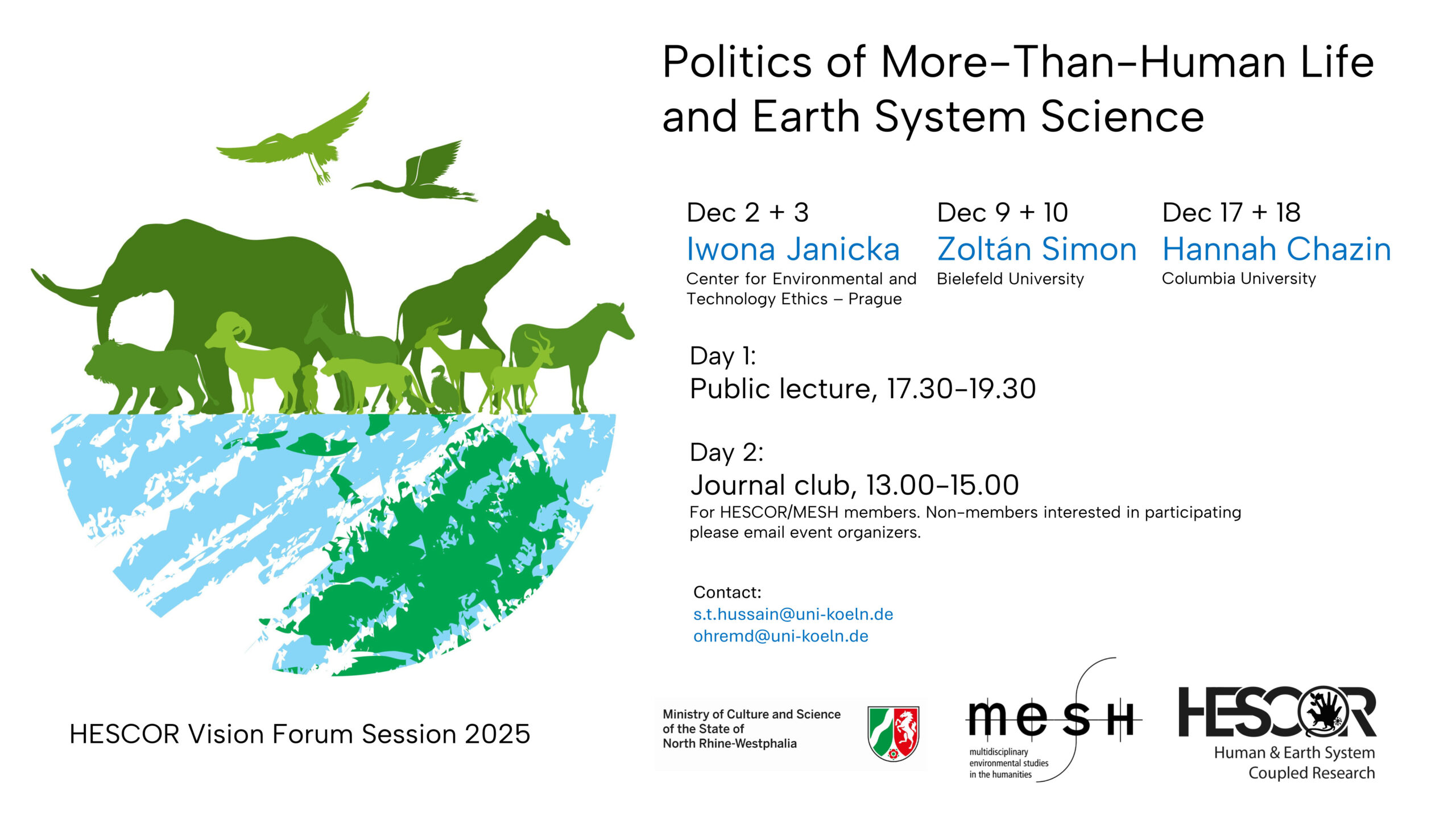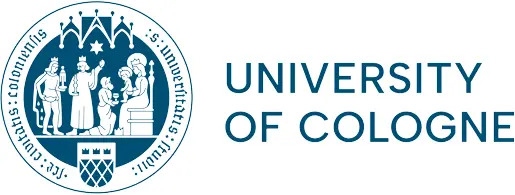 Politics of more-than-human life and Earth System Science
Politics of more-than-human life and Earth System SciencePublic Evening Lectures:
December 2 & 3 December 9 & 10 December 17 & 18, 2025 | 17:30 – 19:30 | Auerbach Library, MESH
This series of events is co-organized by MESH and the HESCOR research hub on the coupled evolution of human and Earth systems. We aim to explore interdisciplinary avenues from within the humanities toward a “humanities-induced” Earth System Science (Simon and Thomas, 2022) – i.e., a perspective on the functioning of the planetary system that takes into account observations and insights from the humanities, including on the role of human agency and multispecies relations.
In the environmental humanities in particular, the deepening planetary polycrisis of the 21st century has been diagnosed as indexing a crisis of human planetary habitation – the ways, that is, in which the majority of humans have come to inhabit and relate to their environments, and how dominant modalities of habitation (fail to) acknowledge the presence and needs of other beings. The polycrisis, in this view, pertains to how many of us have come to live together with other animals, plants, fungi, and microbes, and how modern lifeways have tended to undercut the conditions of planetary habitability for an increasing number of nonhumans.
The evolution of life on Earth (biosphere) is critically propelled by the making and unmaking of patterns of habitability, clearing the path for particular multispecies constellations while disrupting or undoing others. Conditions of habitability are not simply given, however, they are co-made by humans and nonhumans, affecting, and playing out on, different temporal and spatial scales. Habitability is also shaped by how humans and nonhumans arrange themselves within broader multispecies neighborhoods, and how these are negotiated in the first place. Discussing planetary habitability and multispecies coexistence can therefore not be separated from a situated politics of more-than-human life.
The HESCOR MESH Vision Forum Session explores these themes through the lens of planetary philosophy, Anthropocene history, and multispecies archaeology.
The HESCOR MESH Vision Forum Session comprises three separate yet interconnected events, each spanning two successive days, opened by an invited evening talk and followed by a focused discussion of a related key text on day two:
December 2, 2025 | 17:30 – 19:30 | Auerbach Library, MESH
Public Evening Lecture:
Planetary Cohabitability and Coarticulation of Life
Dr Iwona Janicka (Posthuman philosophy, more-than-human politics, and planetary cohabitability), Research Team Leader at the Center for Environmental and Technology Ethics, Prague
December 3, 2025 | 13:00 – 15:00
Journal Club:
For HESCOR/MESH members only. Non-members interested have to register with the event organisers.
We read the recent paper “Habitability: Planetarity vs Cosmopolitics,” Migrating Minds: Journal of Cultural Cosmopolitanism 2.1 (2024), 4-25, https://repository.digital.georgetown.edu/handle/10822/1088561
December 9, 2025 | 17:30 – 19:30 | Auerbach Library, MESH
Public Evening Lecture:
Anthropocene Historiography and Earth System Science
Dr Zoltán B. Simon (Anthropocene history, philosophy of history, interdisciplinary Earth System Science), University of Bielefeld
December 10, 2025 | 13:00 – 15:00
Journal Club:
For HESCOR/MESH members only. Non-members interested have to register with the event organisers.
We read the introduction (“On Plurihistoricity: An Introduction”) of his new book Plurihistoricity: On the Historical Cultures of Extinction, Justice, and the Historical Profession (Routledge 2025)
December 17, 2025 | 17:30 – 19:30 | Auerbach Library, MESH
Public Evening Lecture:
Beyond Resources: Relations of Use and Investigating Zoopolitics in the Past
Prof Dr Hannah Chazin (Multispecies archaeology, pastoralism, zoontology), Columbia University
December 18, 2025 | 13:00 – 15:00
Journal Club:
For HESCOR/MESH members only. Non-members interested have to register with the event organisers.
We read Chapter 1 (“Flyover History and Domestication as an Ontostory”) of her new book Live Stock and Dead Things: The Archaeology of Zoopolitics between Domestication and Modernity (University of Chicago Press 2025)
For more information on the HESCOR MESH Vision Forum Session, please contact event organisers Dr Shumon T. Hussain (s.t.hussain@uni-koeln.de) or Dr Dominik Ohrem (ohremd@uni-koeln.de)

